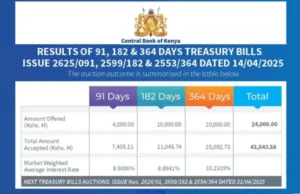Money is perhaps the greatest thing to many alongside the senses of hearing, taste, touch, smell and sight. One can hardly achieve much without money.
But it is surprising that no one wants to admit to have earned enough. We die struggling to get big money but the tragedy is we ignore the small coins that fly our way every day.
And just like a journey of a thousand miles start with a mile, one million shillings must start with that single shilling.
Personal finance experts say that salaried people should shun their comfort zone of an assured income if they want to take charge of their financial destiny. Some professionals have no clue of how to get out of this yoke and their lives and financial destiny have been effectively sealed by a dependency on their pay slips, hence fail to save for rainy days.
Saving money is the rage in most online finance blogs. There are numerous articles on the subject. And people are actively engaged in the exercise. Every New Year, social media is rife with savings challenges, with set daily or weekly amounts committed towards a target. However, the excitement is short-lived as savers fall behind their weekly targets and they soon abandon the challenge even before mid-year.
But many people do not save money the way they should. These people will say that they need every shilling they earn to pay their bills and keep food on the table. The reality, however, is that this kind of thinking forces people into a vicious cycle of living from hand to mouth, regardless of their incomes, while waiting for a windfall so that they can start saving.
Spending more than you earn, no matter how little, is detrimental to savings goals. Instead of your financial situation improving over the years, you will find yourself in a continuous downward spiral. Suppose you see a nice refrigerator in a convenience store and you’ve always wanted one.
Although you do not have enough money left over from your salary to pay the monthly instalments, you decide to buy it on hire purchase, telling yourself that somehow, you will make it. Money follows the law of cause and effect, so by committing yourself to spend more than you earn, you create a deficit which must be met – usually by borrowing more. This additional borrowing creates an even bigger deficit and you start sinking into debt. Savings is relegated into the periphery.
At Abojani, we recommend saving every month, regardless of circumstances, if one wants to get financial security. Often, this involves making some lifestyle changes.
For example, people who eat lunch out every day can cut back on this habit and save by carrying leftover food to work. Assuming that a good helping of lunch costs an average of Sh 300 a day, one can immediately create Sh 600 in two days which can go into savings every week. The habit of carrying food to work two days a week will see these savings rise to Sh 2,400 a month. Brushing one’s shoes and grooming one’s hair instead of getting these services from professional shoe shiners or hair salons, respectively, can save one a tidy sum every month.
Abojani advocates that one way of saving money is to carry a shopping list to the supermarket all the time. Preparing a shopping list ahead helps you to save money in two ways:
- One buys exactly what they need.
- One resists the temptation of impulse buying, a practice that easily derails one’s financial wellbeing.
Supermarkets and some crafty shopkeepers keep candies and confectionaries next to cashiers’ counters to tempt those without a shopping plan.
Entertainment
Another area that wastes money and prevents one from attaining a savings target is entertainment. People spend a lot on pay TV that they don’t really need.
How often do you watch the broadcasts on the many channels you are subscribed to? Do these channels give you anything spectacular that is not available on Free-To-air options?
We advocate that people who find it had to save should cancel these costly subscriptions or change to cheaper packages and channel the savings to emergency funds.
Another entertainment activity is hanging out. People spend a lot of money in bars and nightclubs. Some social places are priced well beyond revelers’ pockets, but they frequent them to prove a point to friends. This comes at a great personal cost. Within a street there may be two establishments charging different prices. One may charge Sh 150 for a bottle of your favourite drink while another may charge Sh 250. The drink is the same taste, after all.
If you have the habit of giving tips to waiters and waitresses, take a pause and add the figures for every outing at an entertainment spot. It is not sustainable to impress in these harsh economic times.
Kenyan entertainment habits are peculiar. It is not uncommon to see decisions made at the spur of a moment:
“Let’s go have a drink!”
Hours later you will see many people replenish their wallets from conveniently placed ATMs or settle bills through Lipa na MPESA. We advise that people plan ahead for every spending.
At home, people spend a fortune on every blockbuster movie release by subscribing to Netflix® or Showmax® yet there are video shops at street corners where you can get them cheap. For those who love reading, borrowing books from libraries is far cheaper than buying every new title.
Minimalist Tips
- Reduce your household electricity bills by using energy-saving bulbs or turning off the lights when not in need.
- Reduce travelling or eliminate it altogether to unlock more money to save.
- Cancel club memberships like the gym, country club, health club etc.
- Buy newspapers only when you need to read certain information you will have heard on radio or TV.
- Reduce eating out in hotels and prepare your food at home. Pack some food to carry on a journey. You will save in food cost and ill health from food poisoning or amoeba.
- Stop outsourcing services you can do yourself like house cleaning or hedge trimming.
- Reduce or eliminate altogether habits like smoking, and alcohol as they constantly drain your pockets.
- Consider moving houses. Rent is the greatest headache to many people in Kenya. It is not wise to struggle to pay high rent when there are many cheaper houses in a different estate or town.
Effort
Obtaining financial freedom is not a preserve of those with a lot of money. It is a long-range plan with a lot of strategies and cumulative efforts. Top millionaires are known to be top savers and frugal spenders. Money saved from many small ways can be channeled to a money market fund and will see you through a rainy day.
If you are employed, it is wise to consider your present salary by saving at least 10% towards both long term and short term goals. If done consistently, you will be surprised at how much you will have saved in a year.
If self-employed, consider saving part of the profit from the business despite the variations. You could consider saving more when your profits are high and reduce in lean times.
The fact is that even those who earn a lot of money will almost naturally spend it all and be broke like the casual labourer. This is because they attempt to maintain class and status that come with their jobs.




